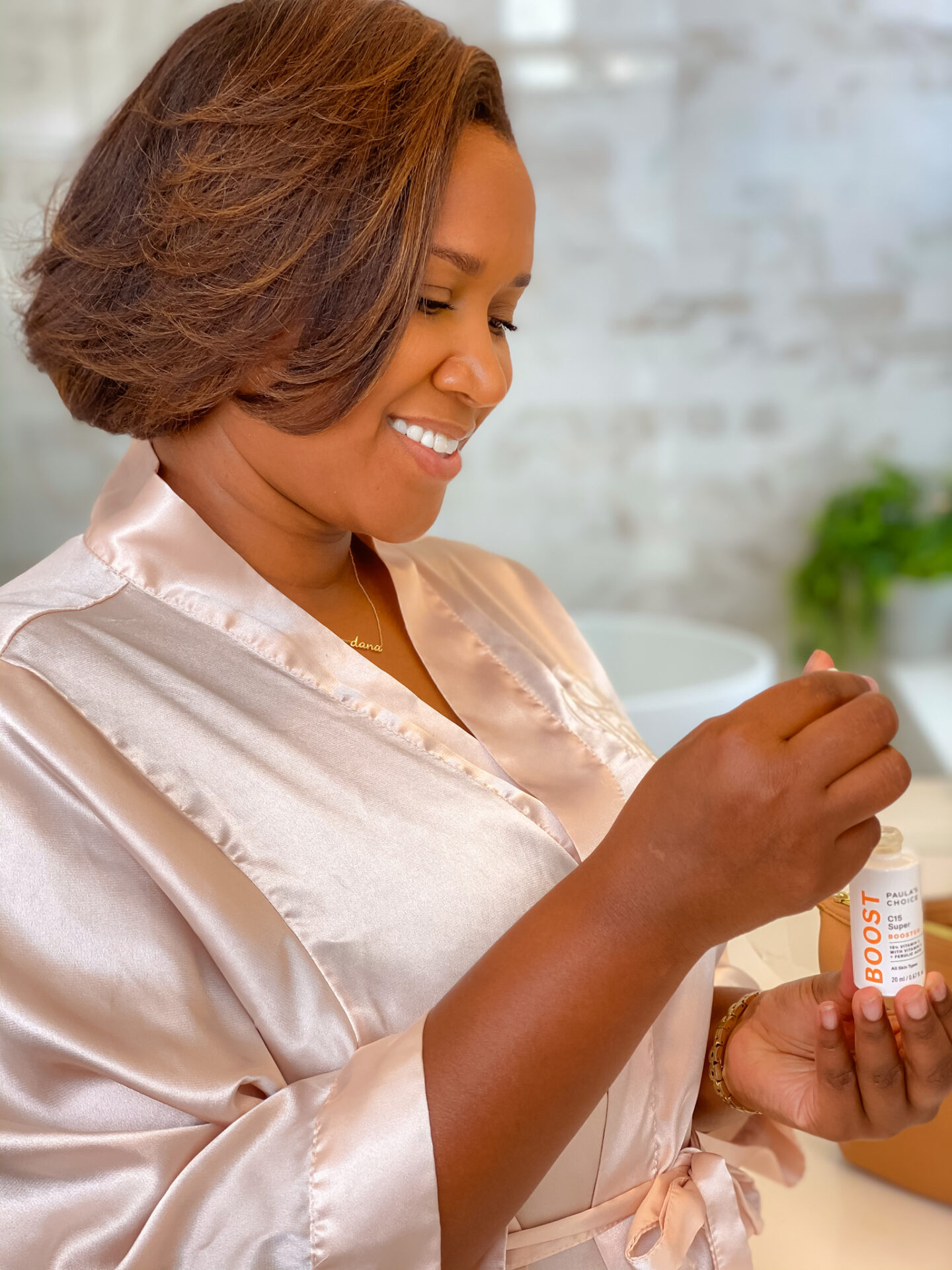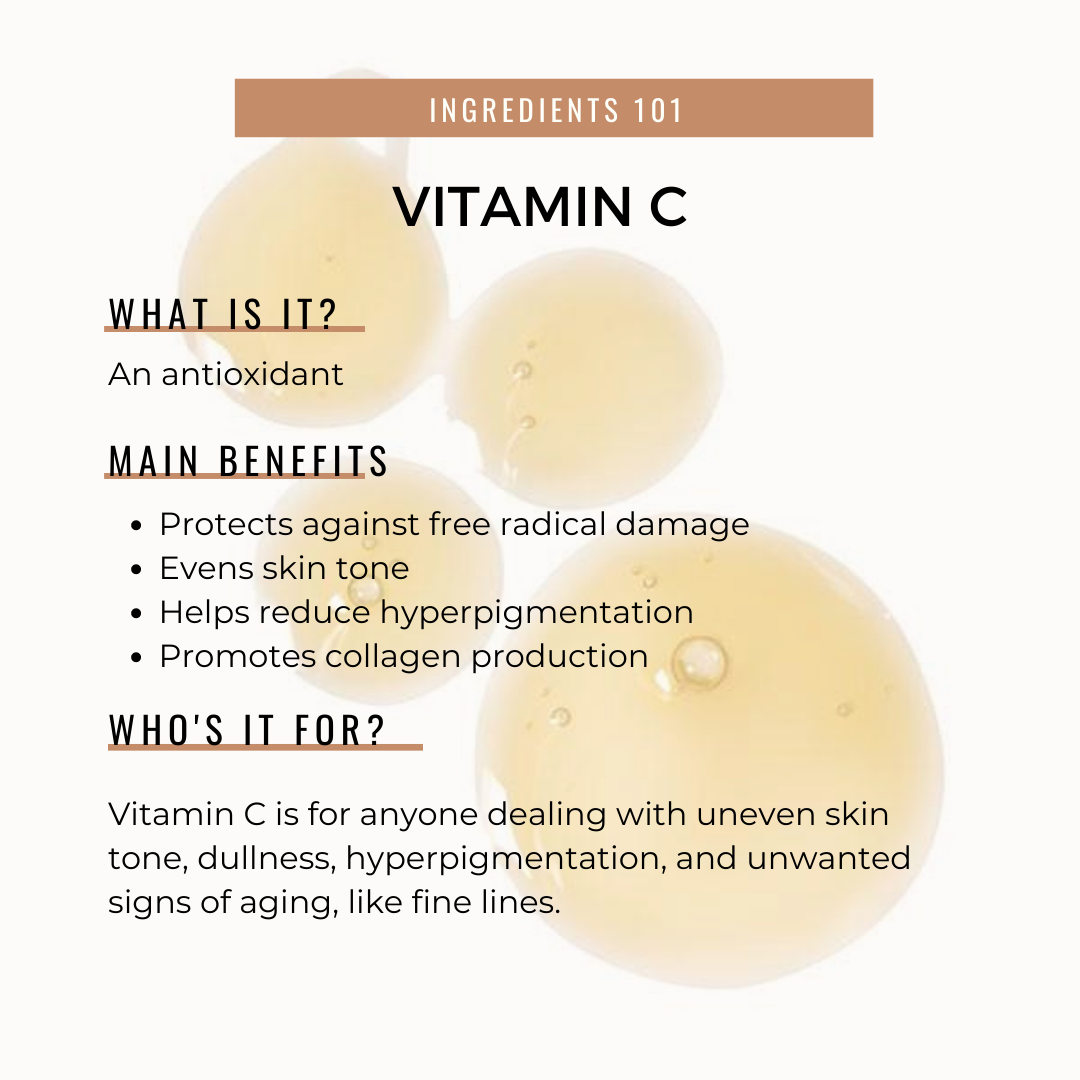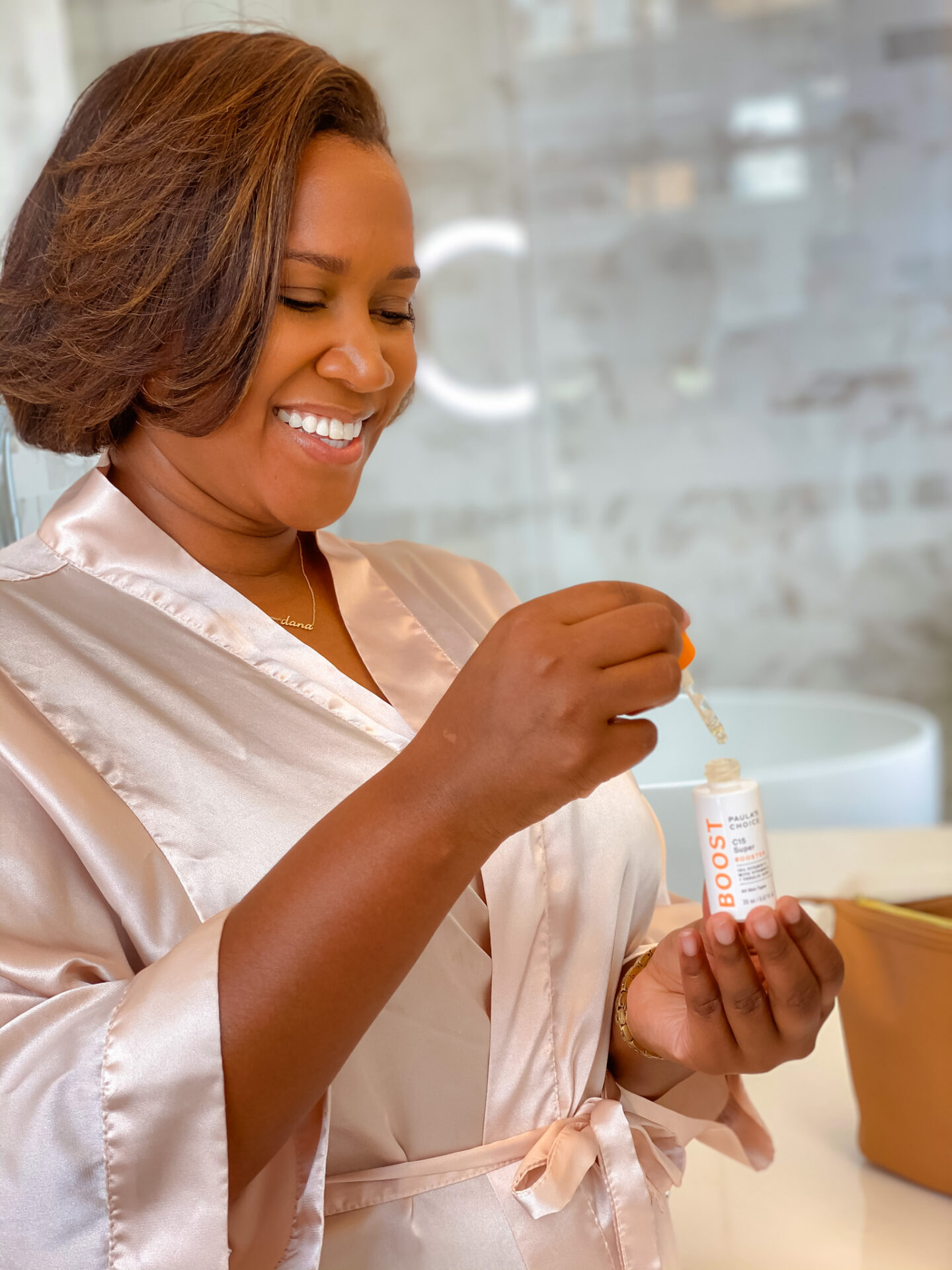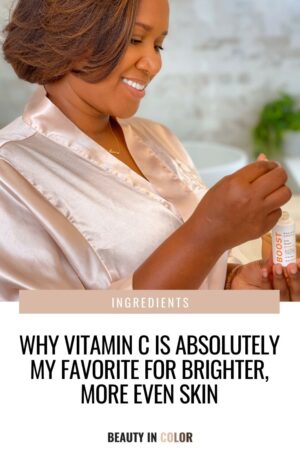Estimated reading time: 9 minutes
Want a brighter, more even complexion? One ingredient I always turn to is Vitamin C. It’s excellent at helping fade hyperpigmentation and dark spots. It’s also an excellent antioxidant, so it helps protect your skin against free radicals and skin damage.
Vitamin C was the first active ingredient I began to use consistently in my skincare journey. And I have been in love with the ingredient ever since.
LAST UPDATED: AUGUST 1, 2023

Vitamin C is a holy grail ingredient in skincare, and for a good reason. But, it can be a tricky ingredient. So, let’s talk more about this powerhouse ingredient.
Today, I’m sharing:
- What is Vitamin C?
- The benefits of Vitamin C for your skin
- When to use Vitamin C in your skincare routine
- Who should avoid Vitamin C?
- The different forms of Vitamin C
- Key things to look for in a Vitamin C product
- Tips & tricks to get the most out of your Vitamin C products
So, what is Vitamin C?
Vitamin C is an antioxidant found naturally in fruits and vegetables that helps combat free radical damage.

What are free radicals?
I’ve heard for years that pollution, particularly these pesky little things called free radicals, can completely ruin your skin. And I live in New York City, so there’s NO WAY I can avoid pollution. Air pollution, like smog, cigarette smoke, UV sunlight, and even the chemicals in your household cleaners, generates free radicals that exist in the atmosphere.
Free radicals are atoms that attach to other cells and start remodeling. And we’re not talking about the kind of remodeling that increases your property value. These free radicals are often a culprit in serious health issues like cancer. Free radicals can also lead to less dangerous but important changes, like the breakdown of collagen production, the damaging of your moisture barrier, and increasing dark spots and hyperpigmentation.
Okay, let’s get back to Vitamin C…
Antioxidants help keep our body and skin healthy. As an antioxidant, Vitamin C protects your skin from those free radicals and UV damage. It also stimulates collagen production and lifts away dark spots revealing bright and glowing skin.
Vitamin C is an antioxidant that’s a natural component of your body. But, as we get older, the Vitamin C levels in our skin decrease due to the free radicals from environmental pollution and sun exposure. And since your body can’t produce more Vitamin C on its own, we need to replenish our skin (and bodies) with Vitamin C.
“Vitamin C fortifies skin, fends off excess free-radicals, and helps limit the damage caused by UV exposure making it perfect for everyday use. It’s like an added measure of protection for your skincare routine.” Deborah Kilgore, Director of Skin Care Knowledge Development Programs at Paula’s Choice
Tweet
The Benefits of Vitamin C for Your Skin

As you can see, Vitamin C is an impressive skincare ingredient:
- Vitamin C protects against environmental stressors: Vitamin C’s primary function is protecting the skin. As we discussed above, free radicals can damage our skin, promoting skin dullness and wrinkles. Vitamin C helps fight the free radicals and UV rays to keep it healthy and improve visible signs of aging.
- Vitamin C promotes collagen production: Collagen gives our skin support and structure, but it breaks down as we age. Vitamin C increases the production of collagen. This, coupled with its antioxidant ability, helps to reduce fine lines, improve the skin’s elasticity, and brighten the complexion.
- Vitamin C helps lighten dark spots: Vitamin C helps lighten unwanted dark spots by inhibiting melanin production.
- Vitamin C helps reduce inflammation: Its anti-inflammatory properties help reduce redness from post-acne scars.
When to Use Vitamin C in Your Skin Care Routine

When to apply your vitamin C serum in your skincare routine can be a controversial topic.
I, personally, use my vitamin C serums in my morning routine. Since Vitamin C helps fight the free radicals of UV rays, I like to use it to protect my skin before I go out into the atmosphere where most of those free radicals exist.
When I apply my Vitamin C serum in the morning, it’s usually the first product I put on after cleansing (and toning – if you use a toner in the morning). I apply it as my first serum because it allows for the best product penetration.
Who should avoid Vitamin C?
If you have citrus allergies, you might want to avoid Vitamin C. And, if you have sensitive skin, I would recommend starting with a lower concentration of Vitamin C and testing an area of your skin to make sure no allergies or irritation exists.
Talk to your dermatologist to see what Vitamin C formula may work best for you.
The Different Forms of Vitamin C
More than one form of vitamin C can be found in beauty products, and the most researched of all is ascorbic acid or l-ascorbic acid. The other vitamin C derivatives are:
- sodium ascorbyl phosphate
- ascorbyl palmitate
- retinyl ascorbate
- tetrahexyldecyl ascorbate and
- magnesium ascorbyl phosphate
These derivatives are not pure vitamin C, but they’re combined with other ingredients to help keep Vitamin C more stable. When these derivatives come in contact with your skin, they release the pure Vitamin C onto it.
Regardless of the formula, vitamin C and its derivatives all provide antioxidant protection, shielding skin from damaging environmental stressors.
FREE CHEAT SHEET!
Download this resource to familiarize yourself with the types of vitamin C found in skincare products. While L-ascorbic acid is the most researched of vitamin C’s, it can be very acidic and unstable. So you might consider one of the many vitamin C derivatives instead. Most of them will gently deliver similar benefits and offer a much longer shelf life.
With this cheat sheet, you can better identify vitamin C in your products and make a more informed decision about which type to use in your skincare routine.
Two Key Things To Look For in A Vitamin C Product

PACKAGING
Believe it or not, the packaging that Vitamin C products come in is super important.
“Vitamin C, specifically Ascorbic Acid, is prone to experience stability issues. It is essential to ensure Vitamin C products are stored and packaged correctly to mitigate the chances of oxidation. When shopping for Vitamin C products, always look for packaging that is opaque and in airless bottles.” Esther Clement, Cosmetic Chemist, known as @themelaninchemist
Tweet
Vitamin C serums should have air-tight and dark packaging because Vitamin C can oxidize and darken due to sun and air exposure.
Vitamin C serums also tend to last about three months after opening (no matter what the brand might tell you). If it turns yellow, reddish, or brown, it’s probably time to get rid of it. Your vitamin C formula should be colorless. The darker it turns, the more it loses its potency. The same is true if you detect a rancid odor.
CONCENTRATION
Identifying the right concentration for your skin type is essential to how effective your vitamin C product will be.
It’s important to start with a lower concentration and increase your concentration as tolerated since the effects are different at various concentrations.
- 0.6% will give you results
- ~5% is ideal for sensitive skin types and less likely to be irritating
- 10%-15% suitable for normal skin types
- 15%-20% helps target issues more strongly
- 20%+ is an intense strength but can help quickly target dark spots/hyperpigmentation
What about encapsulation?
The encapsulation of active ingredients is essential for many applications. Encapsulation is the process of protecting and surrounding an ingredient to protect it from its environment and to increase stability.
“Innovation has worked to reduce the stability problems of Vitamin C by using encapsulation technology. Vitamin C is stored in these micronized capsules that not only allow for less chance of oxidation, but also allow for Vitamin C to be more bioavailable to the skin and provide a more elegant and robust formula.” Esther Clement, Cosmetic Chemist, known as @themelaninchemist
Tips & Tricks to get the most out of your Vitamin C products

Use vitamin C serums in the morning.
There’s certainly no law against using vitamin C products in the evening, but you may get the most benefit from using them in the morning. In general, vitamin C products should be applied in the morning before heading out for the day, when UV radiation is at its highest.
But vitamin C becomes less effective when exposed to light, so it’s essential to give it time to absorb into your skin before going outside. You don’t need to wait a specific amount of time. As long as it’s absorbed, you’re good to go.
Use the right concentration of vitamin C for your skin type and concerns.
There are a wide variety of concentrations of vitamin C. In general, they range from below 5% up to 30% and can have different effects at those concentrations. As we discussed above:
- 0.6% will give you results
- ~5% is ideal for sensitive skin types and less likely to be irritating
- 10%-15% suitable for normal skin types
- 15%-20% helps target issues more strongly
- 20%+ is an intense strength but can help quickly target dark spots/hyperpigmentation
Watch which vitamin C ingredients you mix together.
Vitamin C is pretty safe and well-tolerated. But, if you have sensitive skin, it might irritate you, especially if you use it in the same part of your routine as other highly potent active ingredients. I, personally, don’t use Vitamin C in the same routine with other potent actives due to skin irritation. I tend to use Vitamin C in my morning routine and other actives, like exfoliators and retinol, in my evening routine.
Make sure to store your vitamin C products in the right place.
Vitamin C serums are sensitive to light and air. When exposed, it can oxidize, making it less stable and less effective. So, these products should be stored in opaque containers that are either air-restrictive or airtight. I would also recommend not keeping your Vitamin C serums in the bathroom for that reason too. I, personally, keep them on my vanity.
Notice if the product has changed color.
Your vitamin C serum should be colorless or have a faint hue of color. If your product has oxidized, it becomes yellow or brown and will likely be less effective. Consider getting rid of any vitamin C products that have dramatically changed color since you bought them.
Don’t limit yourself to serums.
The most common way to get vitamin C in a skincare routine is in a serum. But if you’d rather not add an extra step to your regimen or want a lower concentration, know that you can get Vitamin C in cleansers, exfoliants, and moisturizers.
Do you use a Vitamin C product in your routine?
If so, which one are you using? Let me know your favorites in the comments!
Take a look at some of my Vitamin C serum recommendations for all price points below!


[…] like sunscreen, niacinamide, vitamin C, vitamin E are basically free-radical fighters. Free radicals are responsible for breaking down the […]
[…] knows how much I love Vitamin C for my skin. Vitamin C is an antioxidant that helps your skin’s natural regeneration […]
My name is Sam Williams, and I enjoy reading about the beauty of the skin and this blog is very informative. I find it very interesting.
So glad you found it informative!